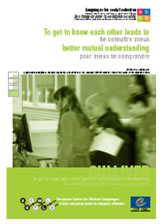 |
Bedyńska, Magdalena / Darabos, Zsuzsa / Gillet, Geneviève / Kerschbaumer, Markus / Politi, Irene / Zahradníková , Jirina (eds.) , To get to kP now each other leads to better mutual understanding / Se connaître mieux pour mieux se comprendre, Strasbourg / Graz: Council of Europe / European Centre for Modern Languages, 2007, [ CD-Rom].
Available online:
|
| |
ABSTRACT
This CD-Rom examines the place of intercultural competence in the language classroom, based on the example of the “Gulliver” Internet forum, with contributors from 23 classes in 22 different European countries. The impetus for the Gulliver project was the realisation that there will never be a truly united Europe without better mutual knowledge and understanding among its citizens. Now, at the start of the 21st century, when so many frontiers have disappeared, how far have we got in achieving a common European identity? What role does education play in developing intercultural awareness? What is the relationship between the teaching of languages and the acquisition of intercultural competence? Are schools really equipped to assume this responsibility?
As a way of promoting the acquisition of intercultural competence while taking account of the real context of Europe today, the Gulliver project established an intercultural forum on the Internet for a network of language classes based in a cross-section of European countries. Through their virtual voyages on the forum, the students discovered many countries through their cultures and languages. This experience enabled the possibilities, advantages and real effects of such an approach within the framework of language education to be pinpointed.
The CD is targeted primarily at school teachers wishing to teach intercultural competence as well as language learners, textbook authors and curriculum developers. The instrument can above all be used in setting up an intercultural forum or for preparing lessons for language classes. It includes:
- methodological sections;
- information and practical advice;
- a first-hand description of the experience of the Czech class participating in the forum;
- the list of topics addressed by the students based around three main themes – Yesterday, Today and Tomorrow – and the approach applied;
- a selection of students’ contributions illustrating the type of class work that may be carried out on an intercultural forum.
Editors:
- Magdalena Bedyńska,
- Zsuzsa Darabos,
- Geneviève Gillet,
- Markus Kerschbaumer,
- Irene Politi,
- Jirina Zahradníková
|

